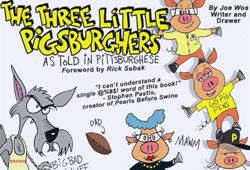
Written and Illustrated by Joe Wos
In 1812, Jacob and Wilhelm Grimm published their first edition of Children’s and Household Tales, featuring 86 fairy tales collected from throughout Germany. By the time the final edition was released in 1857, the tally of what is now more commonly known as Grimm’s Fairy Tales had risen to 211 and contained the majority of the most widely read stories in western culture.
“What fascinated or compelled the Grimms to concentrate on old German literature was a belief that the most natural and pure forms of culture – those which held the community together – were linguistic,” University of Minnesota professor Jack Zipes explains in The Brothers Grimm: From Enchanted Forests to the Modern World. “They were intent on using the tales to document basic truths about the customs and practices of the German people and on preserving their authentic ties to the oral tradition.”
In 2014, Pittsburgh cartoonist Joe Wos decided to continue the tradition of the Brothers Grimm, albeit in a slightly different fashion. Instead of collecting narratives unique to the Pittsburgh region, Wos took one of the most popular fairy tales of all time – the story of the Three Little Pigs – and gave it a Steel City twist.
“I was at a storytelling festival a couple years ago, and every storyteller decided to tell a story in their own language,” Wos said of the concept’s origination. “They told stories in Spanish, in Cherokee and lots of other languages but I realized I only knew English. And then I thought about it for a little while and I realized there was one other language I knew pretty well. And that’s when I decided I would tell a story in my native tongue of Pittsburghese.”
Released in June 2015 after a successful Kickstarter campaign to raise the necessary funds for publication, the resulting Three Little Pigsburghers is indeed a localized fairy tale told in the unique dialect that is found within the Pittsburgh region.
“In my story, the Big Bad Wolf wouldn’t say ‘I’ll huff and I’ll puff and I’ll blow your house down,’ he would say something very different,” Joe Wos explained on Kickstarter. “He may say something like ‘I’ze goin’ to huff, and I’ze goin’ to puff, and I’ze goin’ to blow yunz house down.’ That is Pittsburghese. The New York Times once referred to Pittsburghese as the Galapagos Islands of the English language. Of course the New York Times also endorsed Wendell Willkie and Thomas Dewey for President of the United States. Pittsburghese is a beautiful language, far more beautiful than lesser romantic languages. Oh sure, ‘tu sei la ragazza più bella del mondo’ has a certain nice sound to it, but ‘Yinz wanna go dahn to Primanti Brodders and grab a couple of Arns?’ has a much more romantic charm.”
The Three Little Pigsburghers is not only overflowing with Pittsburghese but is generously peppered with a plethora of Pittsburgh puns and inside-jokes as well. The “Big Bad Wuff,” for instance, is a Cleveland Browns’ fan, while the father of the main protagonists plays for the Pittsburgh Steelers – as a football.
Instead of building their houses out of straw, sticks, and bricks, the Three Little Pigsburghers construct their homes out of “cardboard bahxes from Gian Iggle” (cardboard boxes from grocery store chain Giant Eagle), “alunamin cans and Arn City bawdles” (aluminum cans and Iron City beer bottles) and “still” (steel).
When the wolf arrives at the third house, he has difficulty finding a place to park his car because one of the pigs has placed chairs in the road to reserve the best spaces, something Pittsburghers are notorious for doing themselves. Add some chipped-chop ham, Franco Harris’ Immaculate Reception, and such localized expressions as “Slick Rick from Turtle Crick,” and The Three Little Pigsburghers is a Steel City smorgasbord that is likewise highly entertaining.
Jacob and Wilhelm Grimm were “nationalists” who believed in a united Germany, and their efforts at creating a collection of fairy tales was an attempt to preserve a Germanic oral tradition before it faded into obscurity. Over 200 years later, that same affinity for his native land has inspired Joe Wos to write The Three Little Pigsburghers.
“I am doing this because I love Pittsburgh,” Wos said. “I love everything about it. The people, the buildings, the food, the art, and the language. This book is a love letter to our city. Although I imagine it would be a pretty ineffective love letter as it is mostly about pigs.”
Anthony Letizia

